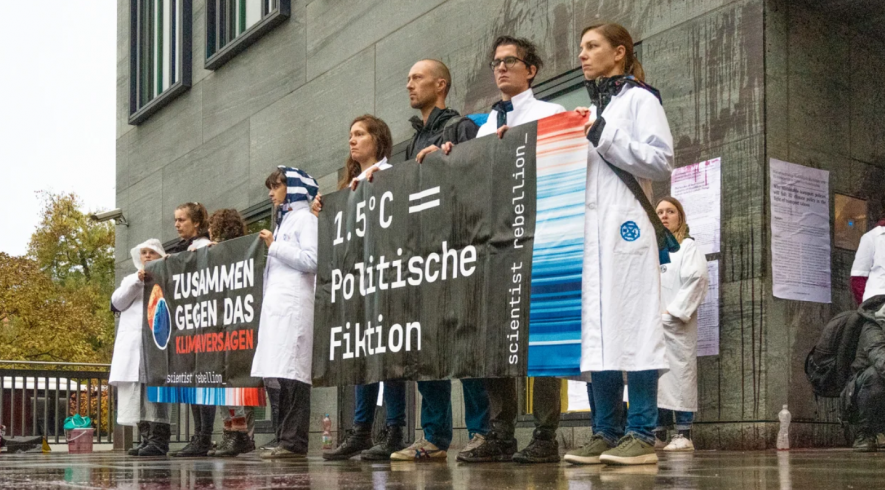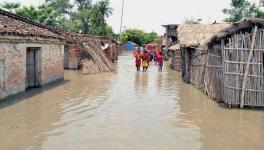COP 28: Scientists Organise Protests Across the World; Say Space for Activists Shrinking at COPs

Image for representational purpose. Courtesy: Scientist Rebellion
‘Scientist Rebellion’ is an international group of researchers and scientists that use non-violent civil disobedience to protest against the apathy of governments and to expose the climate and ecological emergency to the people. This group has been active during COP 28 as well by organising protests in as many as 23 countries throughout the summit held in Dubai—from November 30th to December 12th. The protests aim to oppose the inability of governments to progress towards curtailing greenhouse gas emissions.
The group decided not to fly to Dubai as it would have emitted more carbon into the atmosphere for very little in return. Moreover, although the UAE has allowed peaceful protests, the country is known for its prohibition of protests and criticism of the government. As a result, some of the scientists-turned-activists feared for their safety, as Anil Oza wrote in an article published in Nature.
Many scientists and researchers worldwide now believe that global climate summits like COPs don’t offer much to bring about changes in the policies of governments, and they are now coming out of their laboratories to demand changes. Commenting on it, Rose Abramoff, who is a climate scientist at the Ronin Institute, New Jersey, was quoted to have said in Anil Oza’s article: “Researchers have found that publishing papers, drafting policy briefs, and even talking to high-level political leaders hasn’t translated into policy action, so they are now stepping out of the laboratory to demand change. And they have discovered that demonstrating at global summits such as COP28 doesn’t accomplish much.”
Fernando Racimo, an evolutionary biologist based in Copenhagen, Denmark, and a part of ‘Scientist Rebellion,’ is engaged in organizing protests in Denmark. In a statement, Racimo said, “These summits, which have been held since 1995, have been a massive failure. Almost 30 years of promises, of pledges, and yet carbon emissions continue to go up to even higher levels. As scientists, we’re recognising this failure.” On the issue of COP 28 being held in UAE, one of the world’s largest oil producers, Racimo said, “It’s not just a failure. This time, it’s a mockery of the whole democratic process.”
COP 28 has been criticised for being held in a petro state fearing that fossil fuel lobbyists may influence climate policy when there is mounting evidence of fossil fuels being one of the strongest reasons for global warming to a dangerous level. Notably, it has been revealed that this year’s COP has a record number of fossil fuel lobbyists.
In the Netherlands, the protests by the group, collaborating with a local activist group, stopped a coal-carrying train. This was in order to pressure the government to phase out fossil fuels. Fabian Dablander, a scientist at the University of Amsterdam, who helped organise the protests, said in a statement: “Governments are not blocking the construction of new fossil-fuel infrastructure, which is their duty to us and to future generations to provide a safe, liveable world.”
In Mexico as well, protesting scientists marched through Mexico City sticking scientific papers and findings on cars and windows. The group has said that many more and large-scales protests are being planned.
The Scientist Rebellion group has also circulated an open letter appealing to others to join in the fight for climate action, gathering over 1,400 signatures.
Voices Stifled at COP 28, Say Activists
While the presence of fossil fuel lobbyists at COPs is growing, the space for activists seems to be diminishing. At COP 28 as well, activists have alleged that the rules and regulations are even stricter for protest demonstrations in terms of the number of people allowed to participate and the issues they are allowed to address.
In Dubai, the protest space for climate activists is the Blue Zone, where all the official meetings, sessions, press conferences, and side events are taking place. This zone permits only the delegates, heads of states, admitted observers, and accredited press.
“There’s always been a lot of restriction on civic space inside COPs, but we are really seeing a trend of it increasing. We have to say how loud we’re going to be, and what’s going to be written on the banners. We’re not allowed to name countries and corporations. So, it’s a very sanitised space,” commented Lise Masson of Friends of the Earth International in a statement to the AP News.
An animal activist wearing the costume of a lion, even though not a part of any protest, was moved away by the security personnel. At the Dubai summit, protests have not been allowed around noon, citing heat as the reason. However, activists claim that people come out during lunch at around noon and can pay attention to what the protesters want to say.
It is important to note that blaming only the UAE for space restrictions in COPs wouldn't be fair. For example, during COP 26 in Glasgow, activists struggled to make their voices heard. “Glasgow was the most inaccessible COP we’ve ever seen because of the violence of borders like visa restrictions, as well as restrictions on civic space,” said Masson in the statement.
Climate activists from vulnerable countries like Uganda and the Philippines have come together in Dubai to speak out. Mitzi Jonelle Tan, a climate activist from the Philippines, shared with AP News that sometimes protest approvals aren't obtained in time.
Get the latest reports & analysis with people's perspective on Protests, movements & deep analytical videos, discussions of the current affairs in your Telegram app. Subscribe to NewsClick's Telegram channel & get Real-Time updates on stories, as they get published on our website.























